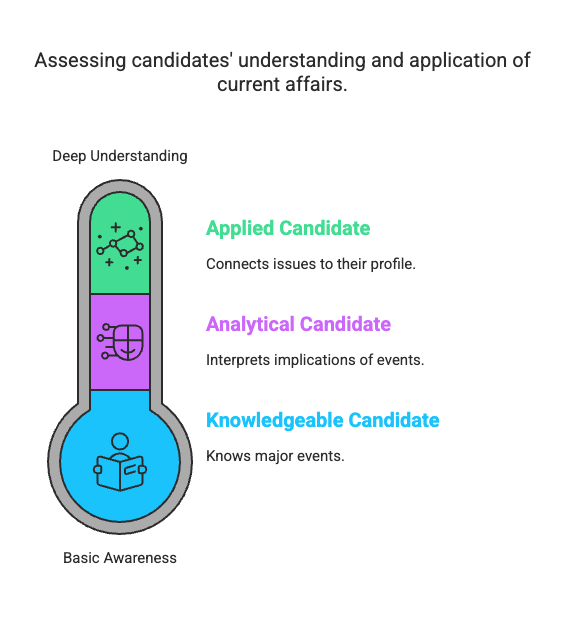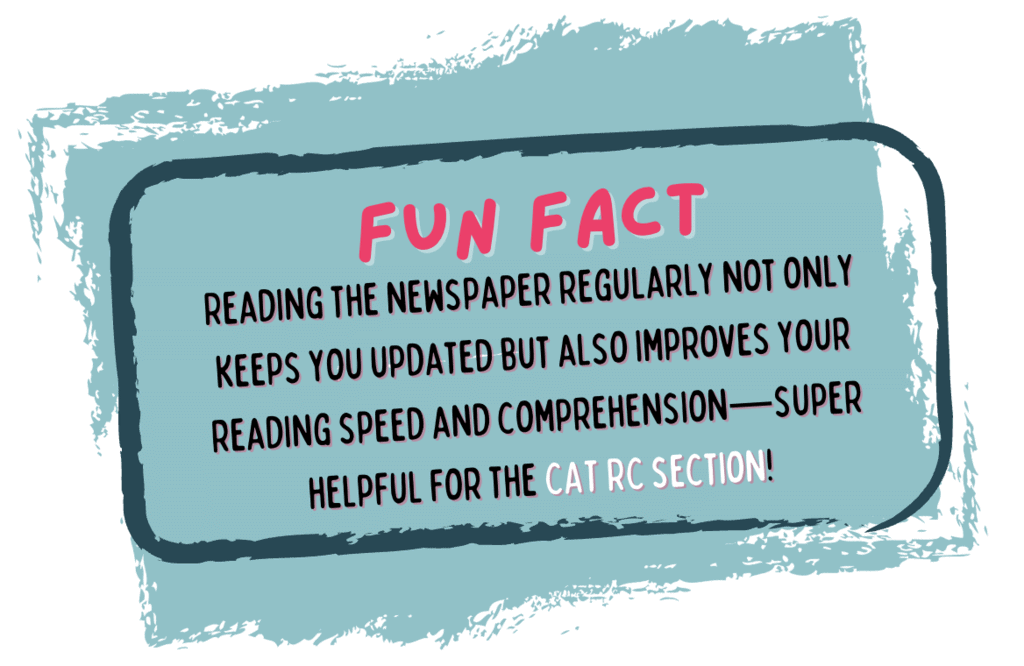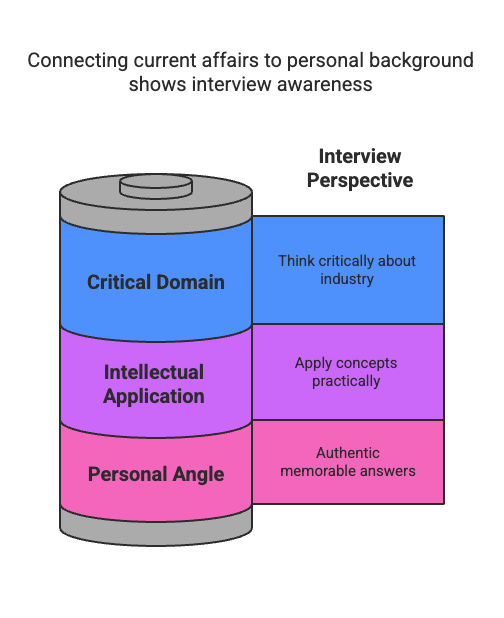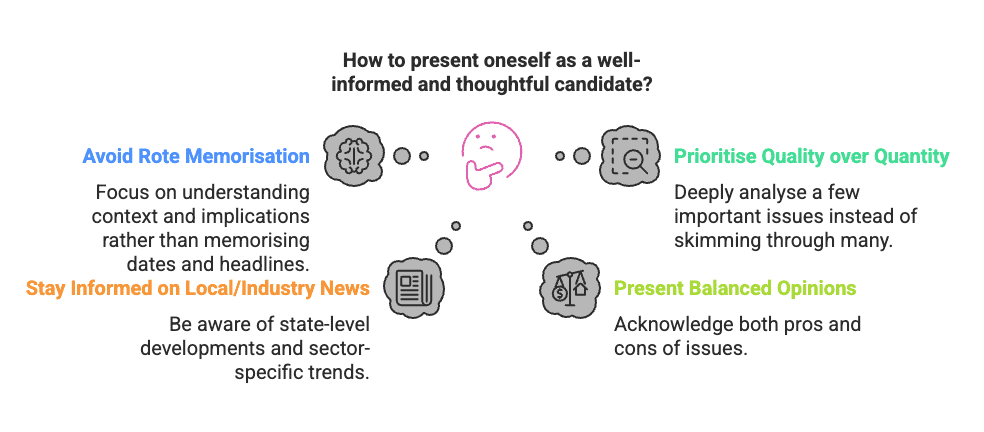How to Prepare for Current Affairs in CAT Interviews: A Strategic Guide | CAT Interview Preparation Guide PDF Download
Are you just reading headlines, or do you really understand what’s happening in the world? In B-school interviews, it’s not just about knowing the news—it’s about how you think about it. In B-school interviews, they help interviewers assess your awareness, maturity, and relevance for management roles. Here’s what they typically look for:
Awareness: Are you well-informed about major national and international events? Interviewers expect you to know what’s happening around you—economically, politically, and socially.
Critical Thinking: Can you go beyond the facts and analyse them? Good candidates can interpret the implications of an event—how it affects businesses, policy, or society—and form a balanced opinion.
Relevance: Can you connect current issues to your own profile? For instance, can you relate a recent policy change to your work experience or link a global event to your career goals? This shows depth and clarity in your thinking.

Building a Systematic Preparation Strategy
A. Timeline-Based Approach
To make current affairs prep efficient and meaningful, it’s important to follow a timeline-based approach. Here’s how you can structure your preparation over time:
6 Months Before the Interview: Build Daily Awareness
Daily Reading (30–45 mins): Make it a habit to read quality newspapers like The Hindu or Indian Express. Focus on editorials, opinion pieces, and business pages for depth.
Monthly Magazines: Add publications like Yojana or Economic & Political Weekly to your routine. These provide rich background and context for major socio-political and economic issues.
Audio/Visual Supplements: Stay updated on the go with podcasts and news apps like The Daily (NYT), All India Radio, or InShorts for concise and diverse viewpoints.
3 Months Before the Interview: Deepen Understanding
Organise News Thematically: Start grouping news into categories like Economy, Environment, Geopolitics, Technology, and Business. This helps build a more structured understanding.
Connect with MBA Concepts: Relate real-world events to your academic preparation—e.g., RBI’s repo rate changes can link to Financial Management, or budget announcements to Business Strategy. This adds insight during interviews.
1 Month Before the Interview: Sharpen Your Responses
Revise Key Developments: Focus on high-impact and frequently asked topics such as the Union Budget, Global Summits, or major tech regulations.
Practice Mock Discussions: Simulate 2–3 minute summaries of key events. Aim for clarity, structure, and relevance—this will help in both interviews and GDs.

B. Reliable Sources for Current Affairs
| Category | Sources |
|---|---|
| Daily News | The Hindu, Indian Express, Business Standard |
| Weekly Digests | Mint Primer, Vision IAS Monthly Current Affairs |
| Government Reports | Economic Survey, RBI Bulletins, NITI Aayog Publications |
| Sector-Specific | TechCrunch (startups), DownToEarth (environment), LiveMint (economy) |
Integrating Current Affairs with Your Profile
In interviews, it’s not just about what you know, but how you connect it to who you are. Aligning current affairs with your personal and professional background shows clarity of thought, awareness, and relevance.

Academic Background
Use your field of study as a lens to interpret recent developments. This shows intellectual curiosity and the ability to apply concepts practically.
Example (Engineering): Talk about how the global semiconductor shortage has disrupted supply chains, affecting industries from automotive to consumer electronics. Link this to manufacturing strategies or geopolitical tech rivalries.
Example (Commerce/Economics): Relate inflation trends or budget allocations to concepts like monetary policy or fiscal deficit.
Work Experience
Draw from your professional experiences to reflect on how broader trends influence industries and roles. This highlights your ability to think critically about your domain.
Example (IT): If you've worked on AI/ML projects, bring up recent AI ethics debates, data privacy concerns, or global regulation trends.
Example (Operations): Discuss how supply chain resilience became a priority post-pandemic and how your work contributed to process improvements.
Hobbies & Personal Interests
Your passions offer a unique angle to discuss global issues, making your answers authentic and memorable.
Example (Sustainability Enthusiast): Talk about COP28 outcomes, green hydrogen policy, or India’s clean energy targets.
Example (Avid Reader): Share insights from books or articles that helped you understand leadership during crises or economic inequality better.
Developing Analytical Depth
Knowing facts is only the starting point. What sets you apart in interviews and group discussions is your ability to think critically, analyse implications, and form balanced viewpoints. Here's how to move beyond surface-level awareness:
Ask “Why” and “How”
Start questioning the events you read about. This builds cause-and-effect understanding.
Why did the Adani-Hindenburg issue shake investor confidence and impact Indian markets?
How will the Digital Personal Data Protection Act influence how startups handle user data and compliance?
Use Stakeholder Analysis
Identify who gains, who loses, and who gets affected indirectly. This shows empathy and strategic thinking.
Example: Farm Laws
Beneficiaries: Large agribusinesses and supply chain firms
Potential Losers: Small farmers fearing exploitation
Example: PLI Schemes
Winners: Domestic manufacturers
Challenges: Global competitors, implementation hurdles
Form Opinions with Structured Frameworks
Use simple yet effective tools like SWOT or PESTEL to analyse a topic holistically.
Example: India’s Semiconductor Mission
SWOT Analysis:
Strength: Reduces dependency on imports and builds strategic tech capability
Weakness: Requires huge capital and skilled talent
Opportunity: Job creation, boost to electronics and EV sectors
Threat: Intense competition from global hubs like Taiwan and South Korea
Using this approach not only sharpens your thinking but also equips you with structured, confident answers in both written and spoken formats.
Common Mistakes to Avoid
Avoiding these pitfalls can help you present yourself as a well-informed and thoughtful candidate:
Rote Memorisation: Don’t just mug up dates and headlines—focus on understanding the context and implications.
Information Overload: It’s better to deeply analyse 10 important issues than skim through 50. Quality > Quantity.
Neglecting Local/Industry News: Don’t overlook state-level developments or sector-specific trends (e.g., healthtech, agritech)—they show domain awareness.
One-Sided Opinions: Always aim for balance. Acknowledge both pros and cons (e.g., when discussing the farm protests or the Citizenship Amendment Act).

Mock Interviews & Peer Discussions
Consistent practice helps you refine your articulation and approach:
Use Frameworks to Structure Your Thoughts:
STAR Method (Situation, Task, Action, Result): Best for questions on personal opinions, decisions, or experiences.
PEEL Structure (Point, Evidence, Explanation, Link): Ideal for discussing abstract or analytical topics.
Practice with Sample Questions:
“How could the Israel-Hamas conflict affect India’s energy security?”
“What’s your opinion on the RBI’s cautious stance toward cryptocurrency?”
Last-Minute Tips (1 Week Before the Interview)
Revise Key Themes: Focus on broad impact areas like:
Economy: GDP forecasts, inflation, budget allocations
Technology: AI ethics, data protection laws
Environment: COP28, India’s net-zero targets
Stay Composed: If unsure, say, “I’m not fully updated on that, but based on what I know…”—it reflects maturity.
Avoid Controversy: Stay factual and neutral unless clearly asked for a personal opinion.
|
21 videos|18 docs
|
FAQs on How to Prepare for Current Affairs in CAT Interviews: A Strategic Guide - CAT Interview Preparation Guide
| 1. How important are current affairs in CAT interviews? |  |
| 2. What is the best way to integrate current affairs with my profile during the interview? |  |
| 3. How can I develop analytical depth in my responses during the interview? |  |
| 4. What are some common mistakes to avoid during CAT interviews? |  |
| 5. What last-minute tips should I follow one week before the interview? |  |





















